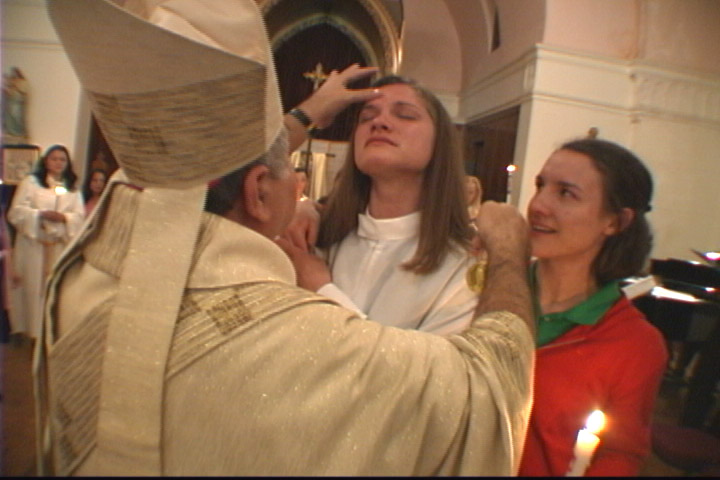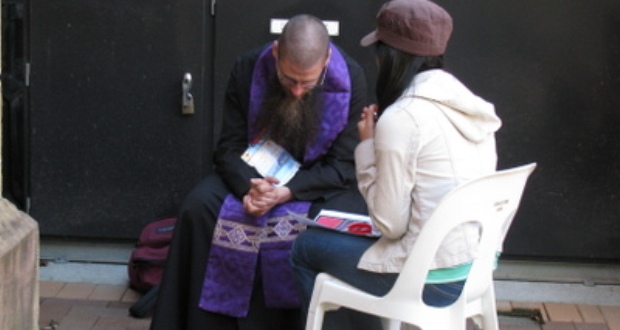The Sacrament of Confirmation

 A sacrament is a sign of God’s love and presence in our lives. Sacraments give sanctifying grace – the free gift of God’s love – God’s life. Confirmation establishes the beginning, NOT the end or “graduation,” of a life of full participation and responsibility in the Church. It is the sacrament where Catholic people decide for themselves that they want to become part of the Catholic Church and follow Catholic teaching. It is given to strengthen the baptized so that they might be more perfectly bound to the Church and, as true witnesses of Christ, spread and defend the faith by word and deed.
A sacrament is a sign of God’s love and presence in our lives. Sacraments give sanctifying grace – the free gift of God’s love – God’s life. Confirmation establishes the beginning, NOT the end or “graduation,” of a life of full participation and responsibility in the Church. It is the sacrament where Catholic people decide for themselves that they want to become part of the Catholic Church and follow Catholic teaching. It is given to strengthen the baptized so that they might be more perfectly bound to the Church and, as true witnesses of Christ, spread and defend the faith by word and deed.
Confirmation is the sacrament in which the candidate receives the fullness of the Holy Spirit that was given to us at Baptism. This is the same Spirit that filled the Apostles with the zeal and courage needed by all who are to be public witnesses to Christ. Confirmation celebrates God’s presence in our lives as the Holy Spirit continues to guide, strengthen, and empower us to live and witness the Good News of Jesus Christ. Christians, on the day of their Confirmation, become public witnesses to Christ and his saving works. Confirmation is not our first encounter with the Holy Spirit. The first encounter takes place at Baptism. The Trinity comes to dwell in the newly baptized as they are born again in water and the Spirit. Baptism brings people into a personal union with God. Thus introduced to the ways of God and the Spirit, the sacrament of Confirmation continues the process by having the Holy Spirit strengthened within us. Confirmation completes and perfects Baptism.
Confirmation is the modern celebration of what happened to Jesus’ apostles on the feast of Pentecost. The Holy Spirit comes to us in the same way he came to the apostles when they were all locked in an upper room together. During Confirmation, the Holy Spirit is said to leave an “indelible mark” on your soul, meaning that you are forever one of God’s children.
We can see, then, the relationship of the Sacraments of Initiation to the liturgy and to the Call to Holiness. The sacraments draw humanity into the truth and love of God revealed in Christ, thereby disposing the faithful to live this love more deeply in their daily lives of Christian freedom and witness. The celebration of the sacraments are themselves supreme witnesses to the truth of the Gospel. Above all, this is true of the Eucharist, during which the Gospel message and the Church are made manifest (see SC 6-8, LG 26). The relation of Baptism and Confirmation to the Eucharist becomes clear; each prepares a person to take his appointed place within the life of the Church. Baptism makes one a member of Christ’s Body, the Church, sharing in the apostolic mission as a child of God offering Him spiritual worship (see CCC – 1213). Confirmation is given to strengthen the baptized that they might be more perfectly bound to the Church and, as true witnesses of Christ, spread and defend the faith by word and deed (see CCC 1287). Like Christ, the confirmed have been anointed by God to “bring glad tidings” (see Luke 4:18). In the Eucharist, those who have received the baptismal priesthood and the anointing of confirmation publicly proclaim the Gospel in union with the whole Church as they participate in the Lord’s own sacrifice (see CCC 1322). Thus, fully-initiated Christians render glory to God, grow in holiness, and announce the Good News until Christ comes again in glory.
Like all Sacraments, Confirmation was instituted by Christ. In the early Church we hear that after Baptism the Apostles would impose their hands upon Christians for the reception of the Holy Spirit (Acts 8:14-17; Hebrews 6:2). Confirmation corresponds to this laying on of hands, which in time came to include an anointing with Sacred Chrism. In the first centuries, this usually meant that baptism and confirmation were celebrated in unison. From the earliest times, then, Confirmation has been closely connected to the Sacrament of Baptism and to a sense of apostolic mission. These connections have been maintained across the centuries despite diverse cultural and pastoral situations. The Sacrament of Confirmation completes the baptismal grace. That is, the Holy Spirit, first received in Baptism, now strengthens the Christian, binding him more perfectly to Christ and the Church so that, as a true witness of Christ, he might spread and defend the faith by word and deed (see CCC 1285). Thus it is not accurate to connect Confirmation to maturity in the psychological sense so that it would best given at an age of social maturity. The Sacrament of Confirmation strengthens the person to bear witness, rather than expresses the person’s determination to bear witness, to his faith. This strengthening is something that can be fittingly given at any age. By the reception of Confirmation, the Christian is given the grace to take his place in the life and apostolic mission of the Church. That mission is, first of all, to go out to all the world and witness to the Gospel of Christ. This witness is carried out in word and deed, in sacrament and service, by the power and inspiration of the Holy Spirit, with the guidance of the Apostles and their successors. The premier expression of the Gospel, the great act of Witness, the prolongation and fulfillment of the apostolic mission, is the worship of God and the salvation of man effected in the Paschal Mystery celebrated in the Eucharist. For a Christian publicly to take his place in the Eucharistic assembly is the greatest participation in the apostolic mission of the Church that is imaginable. The greatness of the Martyrs is found here: in their daily lives they lived fully what they celebrated at Mass. The two Sacraments at the service of communion, Holy Orders and Matrimony, serve to build up the people of God in living out of this great Mystery in their Call to Holiness.
Confirmation not only strengthens us and sets us aside as witnesses to the apostolic mission. This strengthening by the Holy Spirit also helps us to overcome the tendency to sin which remains in each of us even after Baptism. The gifts of the Holy Spirit foster the formation of supernatural virtue as well as strengthening the natural virtues in the human person. Confirmation cannot be properly looked at as a single event, done and then forgotten, like some type of ‘immunization’ or ‘graduation’. Confirmation establishes an ongoing relationship with God which animates the ongoing growth in holiness which is the vocation (or call) of all the baptized. The gifts and fruits of the Holy Spirit strengthen our souls by enabling a virtuous exercise of our will and our faculties for the Glory of God. Unduly delaying Confirmation for those who already receive Holy Communion fails to accord the person their proper role in the Eucharistic assembly, the life of the Church, and the strengthening of the sacraments. Worse than that, it could entail a denial of their right within the Church to receive the gift of the sacrament once they have met the conditions required by canon law: the age of reason and proper disposition of soul (i.e., in a state of grace and open to receiving the sacrament). (Canon 843).
Confirmation is not about an individual deciding to embrace the faith of Baptism. It is not a human act similar to that of non-Catholic Christians who, perhaps in their early teens, choose to publicly profess that they have accepted Jesus Christ as Lord and Saviour. Sacraments are primarily about God choosing and embracing us not the other way around. In baptism, God marks us unconditionally as a member of His family and coheir with Christ, children by adoption. (see Galatians 4:5-7) Once baptized, at whatever age, we can no more choose to cease being a child of God than we can choose to cease being the child of our natural mother. Confirmation is not our “confirming” Baptism or our faith in Christ; it is Christ confirming us in the Christian life we are already living. It is particularly important in East Texas that we avoid any sacramental catechesis that reflects the notion that Confirmation is a time for the person to individually embrace the faith or to become personally engaged in the work of the Church. It is in the Sacrament of the Eucharist, particularly at the offertory, that we present ourselves as a sacrifice to the Father. Indeed, each moment of daily life is a time to reaffirm the Call to Holiness by a commitment to love of God and neighbor. Each instant calls us to embrace Christ as He has embraced us. Above all, the celebration of the Eucharist is an appropriate sacramental moment for the individual to renew the commitment to service in the Church and in the community for the common good.
References
Catechism of the Catholic Church: paragraph
New Catholic Dictionary Sacrosanctum Concilium, 59, quoted in Catechism of the Catholic Church, 1123 Catholicism Guide- Scott P. Richert
LG — Lumen Gentium,
The Dogmatic Constitution on the Church,
Vatican I Pope John Paul II’s encyclical,
Ecclesia de Eucharistia, April 17, 2003
– The Catechism of the Catholic Church: paragraph 1374





